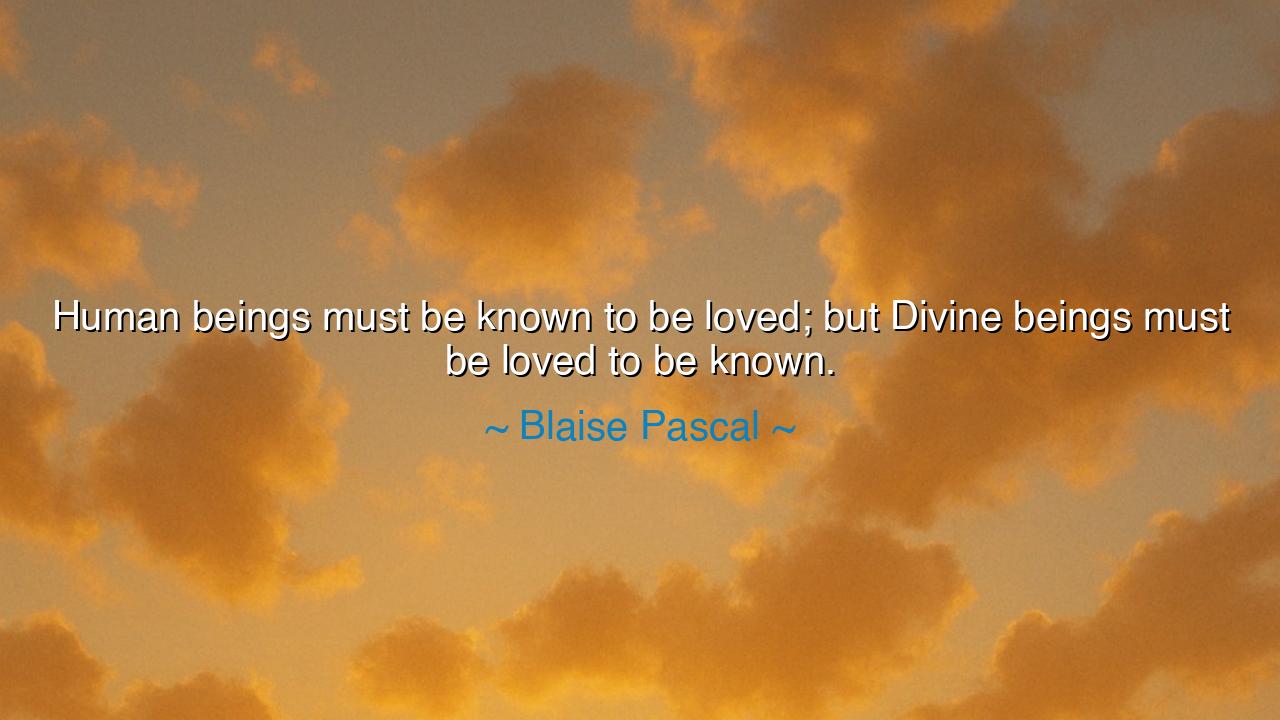
Human beings must be known to be loved; but Divine beings must be






“Human beings must be known to be loved; but Divine beings must be loved to be known.” Thus wrote Blaise Pascal, the philosopher of both reason and faith, the mathematician who mapped the infinite, and yet knelt before its mystery. In this radiant paradox, Pascal captures the two movements of love — one that belongs to earth, and one that ascends to heaven. To love a human being, we must first know them — their face, their voice, their sorrows, their joys. But to know God, to perceive the Divine, one must first love — for love alone opens the eyes of the soul.
Pascal lived in a world awakening to science yet restless for meaning. His mind pierced the fabric of the cosmos, yet his heart was humbled by the silence of the Infinite. In his famous Pensées, he wrote of man’s greatness and misery — a creature suspended between angel and beast, knowing enough to question, but not enough to answer. For Pascal, reason could measure the stars, but not touch the heart of God. He understood that the Divine is not discovered through analysis but through surrender; not grasped by intellect, but revealed through love.
When Pascal says, “Human beings must be known to be loved,” he speaks of the natural order of affection. In the realm of flesh and time, love grows from knowledge — we come to love what we understand. We see the face of another, we learn their stories, we share their burdens; through intimacy, affection blooms. Human love is relational, born of familiarity and trust. Without knowledge, it remains an ideal; with knowledge, it becomes real. Thus, to love mankind, one must learn the faces of the suffering, the hearts of the forgotten. Knowledge gives human love its depth.
But when he continues, “Divine beings must be loved to be known,” Pascal reveals the reversal that defines spiritual truth. God, or the Divine, is not seen through the eyes of flesh but through the eyes of the heart. The intellect seeks proof, but the soul seeks union. Only through love can one perceive the invisible — for love clears the fog of pride, softens the heart, and opens it to the whisper of eternity. To love God is to step into mystery; to love Him first is to find that knowledge follows, not precedes. The Divine hides from arrogance, but reveals itself to humility — and love is the greatest humility of all.
Consider the life of Saint Augustine, who spent his youth in pursuit of pleasure, wisdom, and power. He sought truth through every philosophy, but found only restlessness. It was not until he surrendered his pride and opened his heart to love — the love of the God he could not yet fully comprehend — that revelation came. In his Confessions, he wrote, “Late have I loved Thee, O Beauty ever ancient, ever new.” His knowing began not with sight, but with adoration. This was Pascal’s meaning: that knowledge of the Divine is born not from observation, but from devotion.
This teaching is not confined to one faith. The Sufi mystics of Islam said the same when they proclaimed, “He who knows himself knows his Lord,” meaning that through the love that purifies the self, one perceives the Beloved. The Hindu bhaktas sang of divine love as the bridge between soul and God; the Buddhists spoke of compassion as the highest form of wisdom. Across all traditions, the truth resounds: that the path to spiritual understanding begins not with intellect, but with love — the love that breaks down separation and awakens oneness.
So, O children of both earth and spirit, take this wisdom into your heart: in the realm of man, seek to know before you love, that your affection may be grounded in truth; but in the realm of God, love before you know, that your knowledge may be born of grace. Love the Divine not because you understand, but because you long to understand; not because you see, but because you trust that love itself will grant sight.
For in the end, as Pascal teaches, love is the language of both man and God, but spoken in opposite directions. To love man, we study the face before the soul; to love God, we surrender the mind before the mystery. And when you live by this wisdom — when you know others with compassion and love the Divine with faith — then the two loves, human and holy, will meet within you. You will find that by loving, you come to know; and by knowing, you learn again to love — until knowledge and love become one eternal flame, both human and divine.






AAdministratorAdministrator
Welcome, honored guests. Please leave a comment, we will respond soon